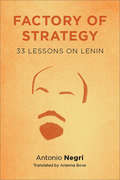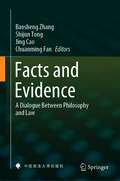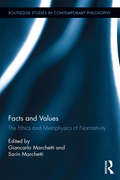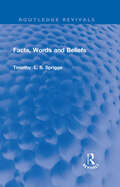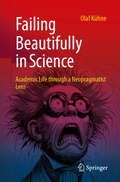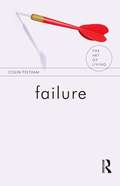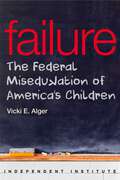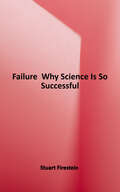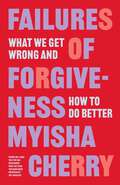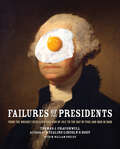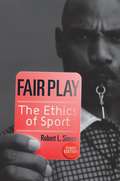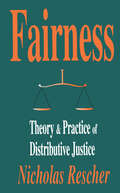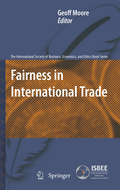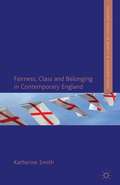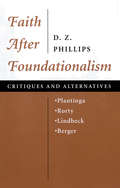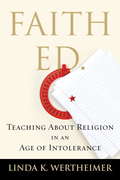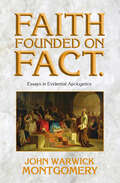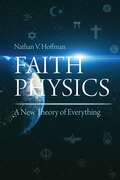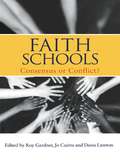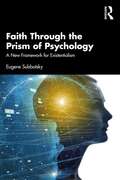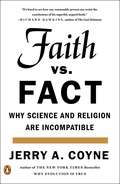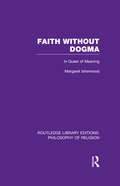- Table View
- List View
Factory of Strategy
by Antonio Negri Arianna BoveFactory of Strategy is the last of Antonio Negri's major political works to be translated into English. Rigorous and accessible, it is both a systematic inquiry into the development of Lenin's thought and an encapsulation of a critical shift in Negri's theoretical trajectory.Lenin is the only prominent politician of the modern era to seriously question the "withering away" and "extinction" of the state, and like Marx, he recognized the link between capitalism and modern sovereignty and the need to destroy capitalism and reconfigure the state. Negri refrains from portraying Lenin as a ferocious dictator enforcing the poor's reappropriation of wealth, nor does he depict him as a mere military tool of a vanguard opposed to the ancien régime. Negri instead champions Leninism's ability to adapt to different working-class compositions in Russia, China, Latin America, and elsewhere. He argues that Lenin developed a new political figure in and beyond modernity and an effective organization capable of absorbing different historical conditions. Negri ultimately urges readers to recognize the universal application of Leninism today and its potential to institutionally -- not anarchically -- dismantle centralized power.
Factory of Strategy: Thirty-Three Lessons on Lenin (Insurrections: Critical Studies in Religion, Politics, and Culture)
by Antonio NegriFactory of Strategy is the last of Antonio Negri's major political works to be translated into English. Rigorous and accessible, it is both a systematic inquiry into the development of Lenin's thought and an encapsulation of a critical shift in Negri's theoretical trajectory.Lenin is the only prominent politician of the modern era to seriously question the "withering away" and "extinction" of the state, and like Marx, he recognized the link between capitalism and modern sovereignty and the need to destroy capitalism and reconfigure the state. Negri refrains from portraying Lenin as a ferocious dictator enforcing the proletariat's reappropriation of wealth, nor does he depict him as a mere military tool of a vanguard opposed to the Ancien Régime. Negri instead champions Leninism's ability to adapt to different working-class configurations in Russia, China, Latin America, and elsewhere. He argues that Lenin developed a new political figuration in and beyond modernity and an effective organization capable of absorbing different historical conditions. He ultimately urges readers to recognize the universal application of Leninism today and its potential to institutionally—not anarchically—dismantle centralized power.
Facts and Evidence: A Dialogue Between Philosophy and Law
by Jing Cao Baosheng Zhang Shijun Tong Chuanming FanThis book presents an in-depth discussion on two concepts from the field of philosophy and law, in order to improve our understanding of the relation between “fact” and “evidence” in judicial process. Since fact-finding is a difficult task for judges, proof by evidence has been devised to help them access the truth. However, in the process of judicial fact-finding, there is always a gap between fact and truth. This book covers a wide range of topics, from reflections on the concept of “fact,” “evidence” and “fact-finding” in the field of philosophy and law to individual case studies. As such it is a useful reference resource on the continuing research on the judicial proof process for students and scholars.
Facts and Values: The Ethics and Metaphysics of Normativity (Routledge Studies in Contemporary Philosophy)
by Giancarlo Marchetti Sarin MarchettiThis collection offers a synoptic view of current philosophical debates concerning the relationship between facts and values, bringing together a wide spectrum of contributors committed to testing the validity of this dichotomy, exploring alternatives, and assessing their implications. The assumption that facts and values inhabit distinct, unbridgeable conceptual and experiential domains has long dominated scientific and philosophical discourse, but this separation has been seriously called into question from a number of corners. The original essays here collected offer a diversity of responses to fact-value dichotomy, including contributions from Hilary Putnam and Ruth Anna Putnam who are rightly credited with revitalizing philosophical interest in this alleged opposition. Both they, and many of our contributors, are in agreement that the relationship between epistemic developments and evaluative attitudes cannot be framed as a conflict between descriptive and normative understanding. Each chapter demonstrates how and why contrapositions between science and ethics, between facts and values, and between objective and subjective are false dichotomies. Values cannot simply be separated from reason. Facts and Values will therefore prove essential reading for analytic and continental philosophers alike, for theorists of ethics and meta-ethics, and for philosophers of economics and law.
Facts, Words and Beliefs (Routledge Revivals)
by Timothy L.S. SpriggeFirst published in 1970, Facts, Words and Beliefs is concerned primarily with formulating the following question and suggesting the right way of answering it- how can a few stray images or muttered words running through our mind constitute our envisagement of situation perhaps remote in time and place from our present position? From a practical point of view the moments when we envisage the nature of some situation which we believe to exist may not be of any great importance. It would seem that our belief in the existence of such situations lies in some sort of adjustment of our behaviour to them which will be useful if the situations really exist, from the point of view of survival and comfort. The author suggests that these moments of conscious envisagement of such absent situations may be rather a sign of such successful adjustment than a factor in bringing it about, hence of no practical value in themselves. However, if knowledge has any sort of intrinsic value, it must surely lie in those moments when one does consciously envisage some aspects of the world more or less as it really is, and to try to understand the nature of these moments is to try to understand all that is of intrinsic value in knowledge. This book is a must read for scholars and researchers of philosophy.
Failing Beautifully in Science: Academic Life through a Neopragmatist Lens
by Olaf KühneWhen science directs its theoretical and empirical tools toward itself, metatheoretical reflections or sociological studies of science emerge. It examines the function of science for society and explores its relationship to politics. This book does all of this (to some extent). In a different way. Ironically and satirically. It is largely based on the phenomenological, everyday experience of this 'system' and its peculiarities. This experience, captured in caricatures, is in turn linked back to theoretical considerations, particularly neopragmatism with its constitutive ideas of contingency, the importance of language, and irony as a tool for coping with the world. And, of course, its contribution to problem-solving. The book is aimed at people involved with university life—directly or indirectly. But it is particularly aimed at people who are just approaching university life, who react with alienation to customs and incomprehension to certain rituals. It's also aimed at people who are irritated by the demands made by and of universities, on the one hand, and by what they find there, on the other. And those who want to smile about that—and perhaps even at themselves as part of this network.
Failure: Failure (The Art of Living)
by Colin FelthamFailure, success's ugly sister, is inevitable - cognitively, biologically and morally. We all make mistakes, we all die, and we all get it wrong. A chain of flaws can be traced through all phenomena, natural and human. We see impending and actual failures in individual lives, in marriages, careers, in religion, education, psychotherapy, business, nations, and in entire civilizations. And there are chronic and imperceptible failures in everyday domains that most of the time we barely notice, often until it is too late. Colin Feltham expores what constitutes failure across a number of domains. He takes guidance from the work of such diverse philosophers and thinkers as Diogenes, Epictetus, Augustine, Schopenhauer, Kierkegaard, Heidegger, Sartre, Camus, Cioran and Ricoeur, while also drawing on the insights of artists and writers such as van Gogh, Arthur Miller, Philip Larkin, Samuel Beckett, Charles Bukowski and Philip Roth. Precursors and partial synonyms for failure can be seen in the concepts of hamartia, sin, fallenness, non-being, false consciousness and anthropathology. Philosophy can help us but is itself, in its reliance on language and logic, subject to inherent flaws and failures. It is the very pervasiveness yet common denial of failure which makes it a compelling topic that cries out for honest analysis. We live in a time when the cliche of failed Marxism may be segueing frighteningly (for some) into the failure of 'selfish capitalism', in a time of geopolitical uncertainty and failure to address the dire need for agreement and action on climate change. But many of us are also painfully aware of our own shortcomings, our own weakness of will and lack of authenticity. Trying to identify where the lines may be drawn between individual responsibility, social policy, and historical and biological dark forces is a key challenge in this fascinating book.
Failure: The Federal Miseducation of America's Children
by Vicki E. AlgerA comprehensive account and frank assessment of federal involvement in education is long overdue. Education policy expert Vicki E. Alger remedies this deficiency with her book, Failure: The Federal Miseducation of America&’s Children.As its title indicates, Failure makes no effort to sugar coat its findings: Created in 1979, after a lobbying campaign that spanned generations, the Department of Education has failed to live up to its promises. Federal involvement—whether related to testing, funding, or academic curricula—has failed to abide by the Constitution&’s implication that education must remain the domain only of state and local governments and private institutions. Most of all, the central government&’s pervasive meddling in education has failed America&’s school children and their parents. Education policy has long been mired in controversies, often with opposing sides missing the mark. Failure helps us step back from the skirmish du jour and redirects our focus to the big picture, showing us what&’s gone wrong over the decades and the institutional causes of these failures. It also offers a bold blueprint for returning the federal government to its constitutional role and for cultivating an educational system that meets the needs of students and parents, rather than bureaucrats. Concerned citizens of every stripe will benefit from Failure&’s history of federal education policy, its brutally honest report card for the Department of Education, its look at education systems across the globe, and its ambitious policy recommendations. Failure might even succeed in reframing the way the federal education establishment thinks about education policy.
Failure: Why Science is so Successful
by Stuart FiresteinThe general public has a glorified view of the pursuit of scientific research. However, the idealized perception of science as a rule-based, methodical system for accumulating facts could not be further from the truth. Modern science involves the idiosyncratic, often bumbling search for understanding in uncharted territories, full of wrong turns, false findings, and the occasional remarkable success. In his sequel to Ignorance (Oxford University Press, 2012), Stuart Firestein shows us that the scientific enterprise is riddled with mistakes and errors - and that this is a good thing! Failure: Why Science Is So Successful delves into the origins of scientific research as a process that relies upon trial and error, one which inevitably results in a hefty dose of failure. <p><p>Scientists throughout history have relied on failure to guide their research, viewing mistakes as a necessary part of the process. Citing both historical and contemporary examples, Firestein strips away the distorted view of science as infallible to provide the public with a rare, inside glimpse of the messy realities of the scientific process. An insider's view of how science is carried out, this book will delight anyone with an interest in science, from aspiring scientists to curious general readers. Accessible and entertaining, Failure illuminates the greatest and most productive adventure of human history, with all the missteps along the way.
Failures of Forgiveness: What We Get Wrong and How to Do Better
by Myisha CherryPhilosopher Myisha Cherry teaches us the right ways to deal with wrongdoing in our lives and the worldSages from Cicero to Oprah have told us that forgiveness requires us to let go of negative emotions and that it has a unique power to heal our wounds. In Failures of Forgiveness, Myisha Cherry argues that these beliefs couldn&’t be more wrong—and that the ways we think about and use forgiveness, personally and as a society, can often do more harm than good. She presents a new and healthier understanding of forgiveness—one that will give us a better chance to recover from wrongdoing and move toward &“radical repair.&”Cherry began exploring forgiveness after some relatives of the victims of the mass shooting at Emanuel A.M.E. Church in Charleston, South Carolina, forgave what seemed unforgiveable. She was troubled that many observers appeared to be more inspired by these acts of forgiveness than they were motivated to confront the racial hatred that led to the killings. That is a big mistake, Cherry argues. Forgiveness isn&’t magic. We can forgive and still be angry, there can be good reasons not to forgive, and forgiving a wrong without tackling its roots solves nothing. Examining how forgiveness can go wrong in families, between friends, at work, and in the media, politics, and beyond, Cherry addresses forgiveness and race, canceling versus forgiving, self-forgiveness, and more. She takes the burden of forgiveness off those who have been wronged and offers guidance both to those deciding whether and how to forgive and those seeking forgiveness.By showing us how to do forgiveness better, Failures of Forgiveness promises to transform how we deal with wrongdoing in our lives, opening a new path to true healing and reconciliation.
Failures of the Presidents: From the Whiskey Rebellion and War of 1812 to the Bay of Pigs and War in Iraq
by M. William Phelps Thomas J. CraughwellTake a humbling journey through America’s proud history with this engaging and informative look at the nation’s most epic presidential blunders.Failures of the Presidents recounts twenty of the worst bad calls to come out of the executive office, ranging from the nation’s birth to the start of the twenty-first century. Author Thomas Craughwell begins with George Washington, who tried to pay for the Revolutionary War with a tax on whiskey—a choice that sparked the newly formed country’s first bloody rebellion.Centuries later, another George—the second President Bush—was convinced that Iraq was hiding weapons of mass destruction. His invasion of the country resulted in a protracted, deadly, and costly war that gave a serious blow to American credibility around the world.Between these episodes, there were many other regrettable, embarrassing, or downright disastrous mistakes made by residents of the White House—the worst of which are explored in this book.
Fair Play
by Robert L. SimonIn this updated third edition, Simon (philosophy, Hamilton College) provides a philosophical analysis of the ethics of competitive athletics. A critique of moral and ethical relativism is offered in the introductory chapter in order to establish the justifiability of moral judgments made in subsequent sections. Simon defends competition against its critics as being, ideally, a "mutual quest for excellence," as opposed to a mere manifestation of selfishness, and he applies internal and external hypotheses as regards the origin of sports morality to particular issues of sportsmanship and fairness. New to the third edition is an examination of genetic enhancement and sports. Other moral and ethical issues and dilemmas explored include the use of performance-enhancing drugs, gender equity in sports, the commercialization of sports, violence, collegiate athletics, and the role of sports in moral education. Annotation ©2011 Book News, Inc. , Portland, OR (booknews. com)
Fair Play
by Robert L. SimonAddressing both collegiate and professional sports, the updated edition of Fair Play explores the ethical presuppositions of competitive athletics and their connection both to ethical theory and to concrete moral dilemmas that arise in actual athletic competition. A major new section in chapter four examines the ethics of genetically enhancing athletic abilities. Other new material covers the analysis of sports and games according to influential philosopher Bernard Suits; the morality of cheating and the ethics of strategic fouling; and the impact of performance-enhancing drugs on the legitimacy of records. In addition, Simon provides enhanced considerations of the morality of competition in sports, the ethical aspects of violence in sports, and the arguments in defense of intercollegiate sports.
Fairness
by Nicholas RescherIn theory and practice, the notion of fairness is far from simple. The principle is often elusive and subject to confusion, even in institutions of law, usage, and custom. In Fairness, Nicholas Rescher aims to liberate this concept from misunderstandings by showing how its definitive characteristics prevent it from being absorbed by such related conceptions as paternalistic benevolence, radical egalitarianism, and social harmonization. Rescher demonstrates that equality before the state is an instrument of justice, not of social utility or public welfare, and argues that the notion of fairness stops well short of a literal egalitarianism.Rescher disposes of the confusions arising from economists' penchant to focus on individual preferences, from decision theorists' concern for averting envy, and from political theorists' sympathy for egalitarianism. In their place he shows how the idea of distributive equity forms the core of the concept of fairness in matters of distributive justice. The coordination of shares with valid claims is the crux of the concept of fairness. In Rescher's view, this means that the pursuit of fairness requires objective rather than subjective evaluation of the goods being shared. This is something quite different from subjective equity based on the personal evaluation of goods by those laying claim to them. Insofar as subjective equity is a concern, the appropriate procedure for its realization is a process of maximum value distribution. Further, Rescher demonstrates that in matters of distributive justice, the distinction between new ownership and preexisting ownership is pivotal and calls for proceeding on very different principles depending on the case. How one should proceed depends on context, and what is adjudged fair is pragmatic, in that there are different requirements for effectiveness in achieving the aims and purposes of the sort of distribution that is intended.Rescher concludes that fairness is a fundamentally ethical concept. Its distinctive modus operandi contrasts sharply with the aims of paternalism, preference-maximizing, or economic advantage. Fairness will be of interest to philosophers, economists, and political scientists.
Fairness in International Trade
by Geoff MooreThis book arises out of papers delivered at the World Congress of the International Society of Business, Economics and Ethics (ISBEE) held in Cape Town in 2008. There are two sections. First, a number of key papers provide an insight into global business, wealth creation and welfare issues with particular reference to the African continent - appropriate for a Congress that was based in South Africa and drew wide participation from African scholars. Second, it provides the output from a global research project on "Fairness in International Trade" which ran over the two years prior to the Congress. This project drew together the work of scholars in five regions across the globe and is the first time that such a global perspective has been attempted. This book is aimed at academics working in the area of international trade or development economics particularly those who have an interest in the ethical dimensions of trade. It will also be of interest to students of development economics and business ethics particularly at Masters and Doctoral level.
Fairness, Class and Belonging in Contemporary England
by Katherine SmithUsing experiences of the white, English, working-classes in Manchester, this book explores the local frustrations with feeling 'ignored' and 'neglected' by the government through articulations of fairness.
Faith After Foundationalism: Plantinga-rorty-lindbeck-berger-- Critiques And Alternatives (Routledge Library Editions: Philosophy Of Religion Ser.)
by D. Z. PhillipsIn a brilliant series of essays, the distinguished philosopher D. Z. Phillips explores the alternatives for faith after foundationalism. A significant exploration of post-foundationalist thought in its own right, Faith After Foundationalism is also an important evaluation and critique of the theological implications of the views of Alvin Plantinga, Richard Rorty, George Lindbeck, and Peter Berger.Phillips's own position is that one must resist the philosopher's tendency to turn religious mystery into epistemological mystery. To understand how religious concepts are formed is to understand that to speak of God as ?beyond mortal telling? is not to confess a failure of language. God's hiddenness is part of our concept of him?a reflection of the mystery of human life as it is lived.Faith After Foundationalism will be essential reading for philosophers of religion and theologians, as well as for students of contemporary epistemology.
Faith Ed
by Linda K. WertheimerAn intimate cross-country look at the new debate over religion in the public schools A suburban Boston school unwittingly started a firestorm of controversy over a sixth-grade field trip. The class was visiting a mosque to learn about world religions when a handful of boys, unnoticed by their teachers, joined the line of worshippers and acted out the motions of the Muslim call to prayer. A video of the prayer went viral with the title "Wellesley, Massachusetts Public School Students Learn to Pray to Allah." Charges flew that the school exposed the children to Muslims who intended to convert American schoolchildren. Wellesley school officials defended the course, but also acknowledged the delicate dance teachers must perform when dealing with religion in the classroom.Courts long ago banned public school teachers from preaching of any kind. But the question remains: How much should schools teach about the world's religions? Answering that question in recent decades has pitted schools against their communities.Veteran education journalist Linda K. Wertheimer spent months with that class, and traveled to other communities around the nation, listening to voices on all sides of the controversy, including those of clergy, teachers, children, and parents who are Muslim, Jewish, Christian, Sikh, or atheist. In Lumberton, Texas, nearly a hundred people filled a school-board meeting to protest a teacher's dress-up exercise that allowed freshman girls to try on a burka as part of a lesson on Islam. In Wichita, Kansas, a Messianic Jewish family's opposition to a bulletin-board display about Islam in an elementary school led to such upheaval that the school had to hire extra security. Across the country, parents have requested that their children be excused from lessons on Hinduism and Judaism out of fear they will shy away from their own faiths.But in Modesto, a city in the heart of California's Bible Belt, teachers have avoided problems since 2000, when the school system began requiring all high school freshmen to take a world religions course. Students receive comprehensive lessons on the three major world religions, as well as on Sikhism, Hinduism, Buddhism, and often Shintoism, Taoism, and Confucianism. One Pentecostal Christian girl, terrified by "idols," including a six-inch gold Buddha, learned to be comfortable with other students' beliefs. Wertheimer's fascinating investigation, which includes a return to her rural Ohio school, which once ran weekly Christian Bible classes, reveals a public education system struggling to find the right path forward and offers a promising roadmap for raising a new generation of religiously literate Americans.
Faith Founded on Fact: Essays in Evidential Apologetics
by John Warwick MontgomeryA provocative and controversial book intended to encourage Christian to make the case for the truthfulness of Christianity based on factual evidence. Included are chapters on: The Place of Reason in Christian Witness; Science, Theology, and the Miraculous; How Muslims Do Apologetics;, Dr. Johnson as Apologist. Contains the most sophisticated refutation available anywhere of the arguments of David Hume and Anthony Flew against miracles in general and the resurrection of Christ in particular.
Faith Physics: A New Theory of Everything
by Nathan V HoffmanFaith Physics is a new Theory of Everything (ToE) combining ancient spiritual wisdom and modern quantum physics findings to deliver a belief system that is both intellectually sound and spiritually satisfying. It maintains an ineffable Supreme Con
Faith Schools: Consensus or Conflict?
by Roy Gardner Jo Cairns Denis LawtonUntil fairly recently the separation of pupils according to religion was felt to be compatible with a comprehensive education. That consensus no longer holds and there is a strong positive lobby either to absorb faith schools altogether within the state system or at least to dilute their membership ensuring they include children from other faiths, or no faith at all. This book addresses the current concerns, questions and interest surrounding the legitimacy, support and intended expansion of faith schools. Divided into five sections, it includes chapters on: * the legal frameworks for faith schools and the rights of the child* faith-based schools in the UK, Northern Ireland, France and the USA* the impact of faith schools on pupil performance* faith schools, religious education and citizenship* political and research issues. Faith Schools: Consensus or Conflict? is of interest to educators, policymakers, researchers and students of education, religion and sociology.
Faith Through the Prism of Psychology: A New Framework for Existentialism
by Eugene SubbotskyFaith Through the Prism of Psychology introduces readers to the structure and function of the inherent ability of our Self to invest objects with reality — existentialization (EXON). The author moves away from traditional ideas of existence and faith, arguing that it is an inherent ability of an individual mind to invest entities (both objective and subjective) with reality. The book treats faith as a psychological ability of the mind to upgrade the existential statuses of imaginary entities, such as ghosts or gods; the working of faith is operationalized and analyzed in empirical psychological studies. It presents a new model of investing objects with existence, with such structural elements as the belief in object permanence (BOP), magic/ordinary distinguisher (MOD), magic/trick distinguisher (MTD), imaginary/perceived distinguisher (IPD), BOP defense mechanism (BOP/DM) and realities distinguisher (RD). It will be essential reading for anyone interested in existence from psychology, philosophy, art, theology or psychotherapy backgrounds.
Faith Versus Fact
by Jerry A. CoyneThe New York Times bestselling author explains why any attempt to make religion compatible with science is doomed to fail In his provocative new book, evolutionary biologist Jerry A. Coyne lays out in clear, dispassionate detail why the toolkit of science, based on reason and empirical study, is reliable, while that of religion--including faith, dogma, and revelation--leads to incorrect, untestable, or conflicting conclusions. Coyne is responding to a national climate in which over half of Americans don't believe in evolution (and congressmen deny global warming), and warns that religious prejudices and strictures in politics, education, medicine, and social policy are on the rise. Extending the bestselling works of Richard Dawkins, Daniel Dennett, and Christopher Hitchens, he demolishes the claims of religion to provide verifiable "truth" by subjecting those claims to the same tests we use to establish truth in science. Coyne irrefutably demonstrates the grave harm--to individuals and to our planet--in mistaking faith for fact in making the most important decisions about the world we live in.
Faith Versus Fact: Why Science and Religion Are Incompatible
by Jerry A. CoyneThe New York Times bestselling author explains why any attempt to make religion compatible with science is doomed to fail In his provocative new book, evolutionary biologist Jerry A. Coyne lays out in clear, dispassionate detail why the toolkit of science, based on reason and empirical study, is reliable, while that of religion--including faith, dogma, and revelation--leads to incorrect, untestable, or conflicting conclusions. Coyne is responding to a national climate in which over half of Americans don't believe in evolution (and congressmen deny global warming), and warns that religious prejudices and strictures in politics, education, medicine, and social policy are on the rise. Extending the bestselling works of Richard Dawkins, Daniel Dennett, and Christopher Hitchens, he demolishes the claims of religion to provide verifiable "truth" by subjecting those claims to the same tests we use to establish truth in science. Coyne irrefutably demonstrates the grave harm--to individuals and to our planet--in mistaking faith for fact in making the most important decisions about the world we live in.
Faith Without Dogma: In Quest of Meaning (Routledge Library Editions: Philosophy of Religion)
by Margaret IsherwoodLife is a constant search for meaning, and reflective minds need to find deeper and more comprehensive meaning than that normally proffered by the orthodox teaching of any creedal religion. When this book was initially published in 1964, religion had begun to recognize the importance of psychology and psychology had considered a spiritual principle in man. Miss Isherwood’s purpose in writing this book is to relate science and religion more closely. Her theme is that the evolution of consciousness from protozoa provides a link which not only gives grounds for faith in life and an inspiration for carrying development forward, but which reveals that, as we continuously work at deepening our insight into the realms of spirit, the life process appears to us as steadily more meaningful. Her engaging writing style makes this a fascinating glimpse at a philosophy of religion starting to engage with science.
